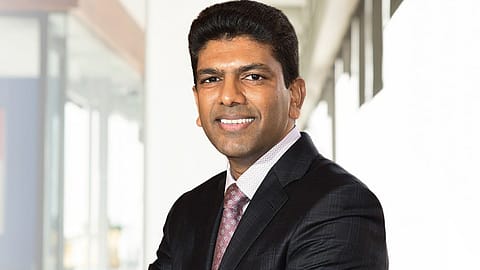IMC 2025: India democratising the engines of tomorrow’s innovation, says MoS Pemmasani Chandra Sekhar
He said digital inclusion—through the JAM Trinity, low-cost internet reaching 900 million users, and UPI’s 10+ billion monthly transactions—has laid the foundation for innovation, enabling every citizen to connect, create, and contribute.

India is building an innovation ecosystem that is inclusive, accessible, and globally competitive said Dr Pemmasani Chandra Sekhar, Union minister of state for communications and rural development, at the India Mobile Congress, 2025, on Wednesday.
Addressing a session titled “Beyond Connectivity: Democratising the Engines of Tomorrow’s Innovation” on the sidelines of the event at Delhi's Yashobhoomi, Chandra Sekhar said, “We are democratising the engines of tomorrow’s innovation—making them work for every Indian”.
Claiming that innovation is in our DNA, and we are awakening it for a new century, Chandra Sekhar said, “What we have achieved is methodical. The world believes in India because India believes in itself”.
Sharing data, he underlined the fact that India has now become the world’s third-largest startup ecosystem. “We are home to over 1.9 lakh startups, while patent filings have doubled, rising from 40,000 in 2014 to more than 80,000 in 2025,” he said.
“A code is being written in Tier III towns, and startups are being born in college dorms. Innovation is no longer a privilege—it is becoming a national habit,” he added.
He said digital inclusion—through the JAM Trinity, low-cost internet reaching 900 million users, and UPI’s 10+ billion monthly transactions—has laid the foundation for innovation, enabling every citizen to connect, create, and contribute.
“Achievements such as Chandrayaan-3, indigenous 4G/5G, the Made-in-India MRI, and a 30-fold rise in defence exports reflect India’s growing technological strength and its journey towards self-reliance,” he added.
Recommended Stories
Chandra Sekhar noted that reforms like GST, the Insolvency and Bankruptcy Code, simplification of the labour law, and abolition of retrospective taxation have created a transparent, investor-friendly environment. “India has shifted from a licence raj to a trust-first model, celebrating entrepreneurs as nation-builders,” he said.
The session was attended by Hiroshi Mikitani, Chairman and CEO, Rakuten Group; Ankur Kapoor, Chief Network Officer, T-Mobile; and Gopal Vittal, Chairman, GSMA.